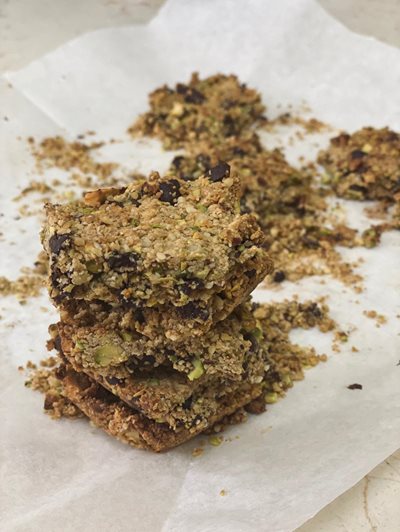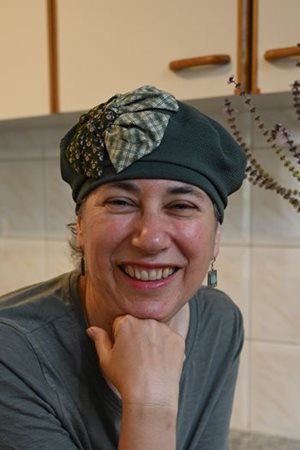
Double Your Impact for Millions
Double Your Impact for Millions
Now is the moment to do more in the fight against Alzheimer’s. When you give by midnight on Jan. 19, your gift can be matched, up to $50,000, to help fund life-changing research and provide critical support for families. Don’t wait — make twice the difference today.
Donate NowRound two of worries to contend with. Two weeks ago, we received word that the physiotherapist in Mom’s care facility was diagnosed with COVID-19. It was highly unlikely that Mom would be infected from the physiotherapist. He wore protective gear throughout his twice-weekly sessions with the residents. And Mom barely participates in those activities. What worried me was if he had infected other staff or residents—those people who she is more exposed to—she could pick it up.
Thankfully, we passed that hurdle with flying colors.
Now, there is more to worry about. Two residents at Mom’s care facility have been taken to hospital after contracting COVID-19; four staff members are in isolation. To isolate the residents from one another so as to prevent any further spreading of the virus, they are all being kept in their separate rooms for most of the day, though the staff does take them out individually for exercise. Of course, the staff makes rounds as well on a scheduled basis.
At least half of the deaths attributed to coronavirus here in Israel have been residents in care facilities. How vulnerable Mom is. And how out of reach.
I just can’t picture how this is working. Is Mom by herself most of the day? Is she okay or bored or lost or lonely? I know she is all these things because Alzheimer’s has reduced her to a memory-less state. But in the context of COVID-19, is she being intentionally left on her own? Despite what Alzheimer’s has done to her brain, Mom remains a very social individual. She loves to talk and chatter. And there is nothing we can do right now to alleviate the situation.
Our attempts to contact Mom via video chat have proven less than stellar. The conversations—if you can call them that—are mostly depressing. She does still nod her head to our loud, out-of-tune singing, but she seems to sleep most days. She is unable to focus on our faces when we video chat. It is unbearably sad to sit next to my dad as he pleadingly calls to her to respond to him, to look at the screen, to wave in return. She can do none of these things.
I think we’ve been calling less because there is this sense that our calls don’t make a real difference. They can’t penetrate her isolation either physically or emotionally.
Music still speaks to Mom. Her headphones, though, have been deemed too problematic to use as too many staff members need to handle them—charging them, putting them on her ears, and taking them off again. Thankfully, my husband Jeff found a small speaker with a slot for the sim card that holds all her music—showtunes and klezmer, jazz and classical compositions. The speaker can be kept plugged in next to her bed with minimal handling by staff.
A few hours after we delivered the speaker, our favorite nurse sent us a video of Mom singing along to Doris Day’s perky “Que Sera Sera,” with closed eyes and completely out of tune, but present!
My worst fear for Mom is that if she gets sick my dad and I can’t be with her. Or, if she declines so rapidly from her Alzheimer’s that we won’t have a chance to say goodbye in person. I want to be with her if these things happen. It aches not being able to hug and kiss my sweet mom.
The thought has crossed my mind that we should bring her home. After two years in the care facility, Mom is different. She is less agitated, less mobile. But so much more dependent on the assistance of others. Would my dad be able to handle her presence once more in their house? Would Mom be in utter confusion? Would we be able to find a good 24-hour caregiver? Is it selfish to think in these terms? I am sure that Dad’s depression would be alleviated if he was allowed to see her. I know they won’t give permission for him to physically kiss or hug her at this stage, but the act of sitting opposite her and making eye contact might be just what he needs. When they do resume visitation, they will only allow one visitor at a time. I will put his needs before mine.
I keep reading that conservative estimates suggest this pandemic will end only two years from now. That means that we must find the fortitude to weather this upheaval long-term. I know there will be days ahead —perhaps weeks or months—that will test me and try my resolve. I know that I will falter; it’s in my nature to give in to my pessimism. We have learned from the past seven months that life is unpredictable and mostly out of our control.
So where does that leave me? I have two main goals. One is to do the best I can in maintaining contact with Mom through video chat and via communications with the director of her care facility. The second is to live my life as profoundly as I can. I may feel like I’m standing still, but I’m not. I am in flux, just as the world is, and while I can’t control where I may end up, I can try and make it a more positive journey.
Walk slowly, my wise friend advised when I told her all I wanted to do was rush to the kitchen and eat chocolate. I am doing that, and also trying a less sugary dessert to help pass the time. These Pistachio Bars are crunchy, satisfying and not too sweet. In truth, not as amazing as the chocolate peanut butter brownies I made two weeks ago, but they will do in a pinch.
 Pistachio Bars
Pistachio Bars
Thank you to my friend Emily for sharing this recipe with me after our shared meal. I think hers held together better, so I’ll have to keep practicing until I get it right. I suspect I need thicker peanut butter.
¾ cup pistachios
¼ cup pecans/almonds/walnuts (your choice)
½ cup rolled oats
¼ cup chocolate chips
¼ cup ground flaxseed
½ teaspoon salt
1 tablespoon brown sugar
3 tablespoons peanut butter (the thicker the better)
3 tablespoon maple syrup
½ teaspoon vanilla
Directions:
Preheat oven to 325° F / 160° C. Coarsely ground nuts and oats in blender, then add remaining ingredients, apart from the chocolate chips. Blend together well until ingredients form a moist batter. Fold in chocolate chips. Pat batter tightly into a small baking pan and bake for 20 to 25 minutes or until the top begins to brown. Let cool for about 20 minutes before cutting into bars. Recipe photo by Liora Green.
 About: Miriam Green is the author of The Lost Kitchen: Reflections and Recipes from an Alzheimer’s Caregiver (Black Opal Books, 2019). She writes a weekly blog at The Lost Kitchen, featuring anecdotes about her mother’s Alzheimer’s and related recipes. She recently presented a TEDx Talk. Miriam’s writing has been published in several journals, including Guideposts Magazine and upcoming Daily Devotionals, Red Wolf Journal, Poet Lore, The Prose Poem Project, Ilanot Review, The Barefoot Review, and Poetica Magazine. Her poem, “Mercy of a Full Womb,” won the 2014 Jewish Literary Journal’s 1st anniversary competition. Her poem, “Questions My Mother Asked, Answers My Father Gave Her,” won the 2013 Reuben Rose Poetry prize. She holds an MA in Creative Writing from Bar Ilan University, and a BA from Oberlin College. You can find Miriam on Facebook and on Twitter. Miriam is a 29-year resident of Israel, and a mother of three.
About: Miriam Green is the author of The Lost Kitchen: Reflections and Recipes from an Alzheimer’s Caregiver (Black Opal Books, 2019). She writes a weekly blog at The Lost Kitchen, featuring anecdotes about her mother’s Alzheimer’s and related recipes. She recently presented a TEDx Talk. Miriam’s writing has been published in several journals, including Guideposts Magazine and upcoming Daily Devotionals, Red Wolf Journal, Poet Lore, The Prose Poem Project, Ilanot Review, The Barefoot Review, and Poetica Magazine. Her poem, “Mercy of a Full Womb,” won the 2014 Jewish Literary Journal’s 1st anniversary competition. Her poem, “Questions My Mother Asked, Answers My Father Gave Her,” won the 2013 Reuben Rose Poetry prize. She holds an MA in Creative Writing from Bar Ilan University, and a BA from Oberlin College. You can find Miriam on Facebook and on Twitter. Miriam is a 29-year resident of Israel, and a mother of three.
Related articles:
COVID-19, Alzheimer's and Dementia: What You Need to Know
